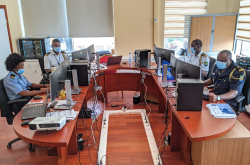2,469 money mules arrested in worldwide crackdown against money laundering
Law enforcement from 25 countries, supported by Europol, Eurojust, INTERPOL and the European Banking Federation (EBF) have joined forces to crack down on one of the most important enablers of money laundering: money mules and their recruiters.
During an operational phase carried out between mid-September to the end of November 2022, 8 755 money mules were identified alongside 222 money mule recruiters, and 2 469 individuals were arrested worldwide.
Now in its eighth edition, the European Money Mule Action (EMMA8) has gone international, with actions carried out in countries as far apart as Colombia, Singapore and Australia.
EMMA is the largest international operation of its kind, built around the idea that public-private information sharing is key to fighting complex modern crimes. This year, and with the continuing coordination of the EBF, around 1 800 banks and financial institutions supported law enforcement in this action, alongside online money transfer services, cryptocurrency exchanges, Fintech and KYC companies, and multinational computer technology corporations.
Overview of the results
2 469 money mules arrested;
1 648 criminal investigations initiated;
4 089 fraudulent transactions identified;
EUR 17.5 million intercepted.
Participating countries
Australia, Austria, Bulgaria, Colombia, Cyprus, Czech Republic, Estonia, Greece, Hungary, Singapore and Hong Kong (China), Ireland, Italy, Moldova, Netherlands, Poland, Portugal, Romania, Slovak Republic, Slovenia, Sweden, Switzerland, Spain, United Kingdom, United States.
A link in the money laundering chain
Have you ever been asked to help transfer money by:
• An online friend or love interest?
• Someone offering a way to make easy money?
• Someone claiming to need help as they can’t use their own bank account?
If yes, you may have been talking to a money mule recruiter – and if you did what they asked, you may have committed a crime.
The issue may seem trivial, yet the amount of criminal money being laundered through this method is not. Money mules are a significant part of the money laundering landscape, enabling criminals to swiftly move funds across a network of accounts, often in different countries.
The use of money mules is especially widespread in cybercrime, with the mules transfer the proceeds from their jurisdiction to the criminal’s home country.




